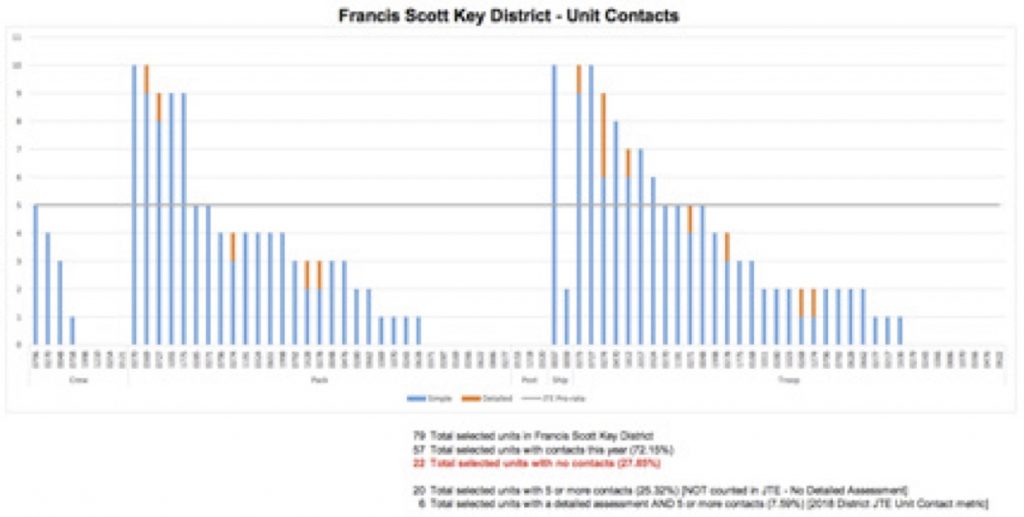For the first time in several years, our council is currently on track to achieve only a bronze level in the “Journey to Excellence” unit contact metric. The good news is that we have time to turn this around before year-end. As has happened in past years, I expect our commissioner staff to record a large number of simple and detailed contacts during the re-charter season.
As all the District Commissioners know, I value metrics to the extent that they help us spot areas for improvement. The important and meaningful goal is that all unit-level Scouters know that unit commissioners care about them, and that units have a connection to the resources, friendships, advice, and activities in the district. This is a noble goal. Recording unit visits is the way we expect unit commissioner to indicate that they are actually fulfilling this meaningful goal.

In 2018, the national “Journey to Excellence” team added a requirement to have one detailed assessment per unit to the unit contact metric. The important and meaningful goal is that unit-level leaders and unit commissioners have a discussion about where the unit stands and develop a few concrete plans on how to improve. This also is a noble goal. Recording detailed assessments does not take long, and is a simple natural by-product of an activity unit commissioners have been doing for decades. Yes, we are asking unit commissioners to do slightly more data entry, but the reason is that with this extra data entry we can easily see at a district level where units might need more service.
Allow me to use my home district, Francis Scott Key (FSK) District, as an example of how these metrics can be useful. Here is a chart (from the end of September) that uses the recorded unit contacts and detailed assessments to give a quick sketch of unit service in the FSK District.
From this chart, we can spot a few interesting things. The horizontal line shows how many contacts a unit should have received according to the Journey to Excellence standard, which is one contact per every two months (for a total of 6 per year). At this point in the year, each unit should have received five recorded contacts. You can see that 57 out of 79 units have received contacts this year. Unit commissioners may have contacted the 22 remaining units, but these contacts are unrecorded so do not show in the chart. We can see on the chart that 9 units have 4 contacts, so are just one short of the standard of 5.
The blue segments indicate simple contacts and the orange segments indicate detailed assessments. The very first unit in the chart, Crew 796, has received 5 simple contacts but no detailed assessments, so is excluded from the Journey to Excellent metrics. FSK District has 12 units like this, so when the unit commissioner performed a detailed assessment (perhaps when the unit commissioner reviews the year-end unit Journey to Excellence scorecard with the unit), these units will achieve the minimum standard required by Journey to Excellence (which is one detailed assessment per unit plus enough simple contacts).
What about the units with no or fewer than five contacts? I know that my good friend Bill Desmond, who is the District Commissioner for FSK, is working with resource constraints, like most commissioners. These units may be strong and in less need of unit contacts, or maybe they have been visited but the contacts have not been recorded, or maybe FSK is short on commissioners in those neighborhoods, or maybe the units have already folded and cannot be visited. The metrics are a quick view but the folks in our districts will have more detailed “localized” knowledge. These charts provide commissioners with the tools they can use to prioritize commissioner service, as we get closer to the year-end finish line, and I trust Bill Desmond and all of my District Commissioners to “do their best” in providing service to our units.
Assistant Council Commissioner Rick Manteuffel posts these reports to the commissioner folders each month. I ask all commissioners to use these reports as input in prioritizing commissioner service in our districts. This is not to buff our metrics, but rather to ensure our units are getting the commissioner service they need and deserve.

